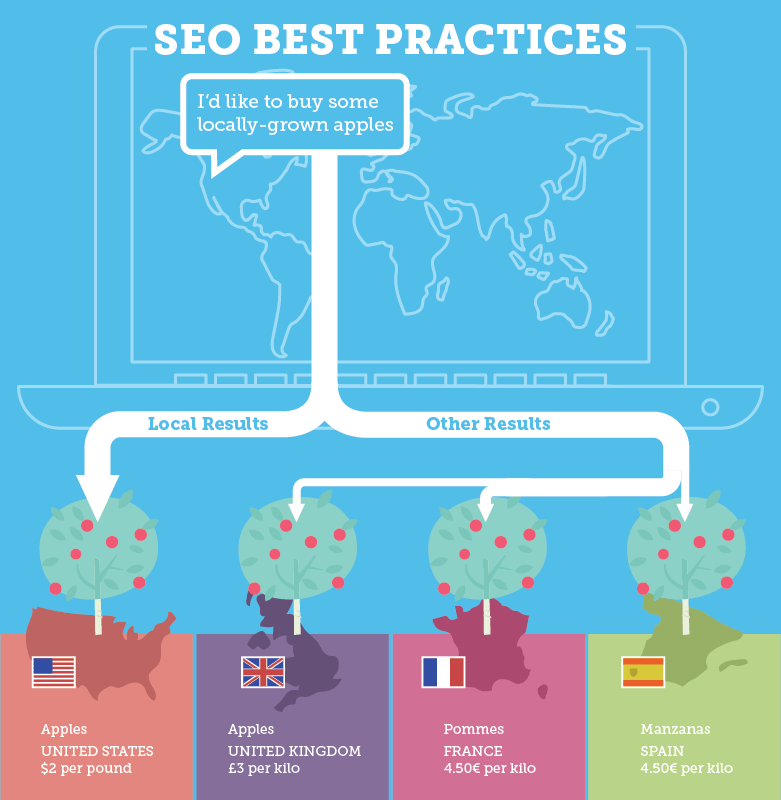Blog article
6 factors to consider in an international SEO strategy
Estimated reading time: 5 minutes

The number of people who speak English is slightly above one billion. This means that if you aren’t implementing an international SEO strategy, you’re ignoring six billion people and leaving a lot of money on the table.
In this post, we’ll show you how to tap into other markets and what you should consider when creating an international SEO strategy.
1. Is your ecommerce store ready for international SEO?

What is international SEO? In basic terms, international SEO is a marketing strategy that improves your ecommerce website’s search presence in more than one country and language.
However, international SEO is expensive.
It requires a lot of your time and money. You’ll need to hire translators, developers, and other professionals to help take your company global.
The first thing to consider is if there’s a market for your product overseas. Imagine you’re an alcohol distiller: It wouldn’t be wise to expand to regions whose residents don’t consume much alcohol (for religious reasons, for instance)—even though you might get some traffic from them—since the market is quite small.
So it’s essential to conduct research and find out if there’s a market for what you’re selling overseas.
2. What languages and regions are you targeting?
When ranking for overseas SEO, first look at your web analytics and see where your visitors are from. You might notice that you receive traffic from China, India, Brazil, and other non-English speaking countries.
Once you know where your visitors are coming from, make a list of these regions and the languages they speak. These are the languages you’ll be translating your content into.
3. How are you going to target these languages and regions?
When translating content, many ecommerce businesses will just use Google Translate because it’s free. However, it isn’t accurate. When a native speaker lands on your website, the content will sound weird, and they’ll leave.
Instead, consider hiring a translator from Upwork or Fiverr. These translators are native speakers, and they’ll translate your content manually. Also, it isn’t expensive. You can get an experienced translator to translate one web page for $30 to $50.
It might not be free, but your content will be more accurate. So when non-English speakers land on your website, the articles flow naturally. This will also reduce your bounce rate, which will lead to a higher SEO score.
4. How will you tell Google which pages to show to each region?
After you’ve hired a freelance translator to manually translate your web pages, you’ll need to tell Google which pages to display to different regions.
For example, if a German-speaking person visits your ecommerce site, Google has to take them to the German version.
To do this, use Hreflang code.
Hreflang code tells Google which pages to show to different regions. So after you’ve set up hreflang code and interlinked your pages to the same language, you’ll be ready to tap into global markets.

However, setting up hreflang code can be complicated and frustrating if you aren’t a developer, which brings us to the next question!
5. Should you hire a developer?
Setting up hreflang code involves in-depth knowledge and expertise in web development. And if you don’t have time to learn all these skills, then consider hiring a developer.
Simply head over to freelancing websites like Upwork, and you’ll get access to thousands of experienced developers. You could also hire them on a project-to-project basis.
This way, you don’t have to worry about hiring a full-time employee. Whenever you need a developer, simply visit Upwork (or a similar freelancing site), and you’re good to go.
6. Do you want to personalize content or take a more general approach?
If you want to improve the user experience for each country you’re targeting, consider personalizing your content. This can be time-consuming; however, it’s an effective way to build relationships with non-English-speaking visitors.
For example, if you’re selling coffee, instead of writing a general post about the best coffee beans under $20, you could write an article about the best local beans in Brazil for under $20. By doing that, you’ll appeal directly to your visitors who are living in Brazil.
Tap into global markets to grow your online store
Using international SEO to tap into global markets increases traffic and sales and builds relationships with people in other countries. International SEO might be expensive and time-consuming, but if there’s a market for your product, it’ll take your ecommerce store to the next level.
If you’re looking to grow your ecommerce website with international SEO, feel free to schedule a Verbolia demo with our SEO experts.
About The Author
How can Verbolia help your e-commerce platform.


